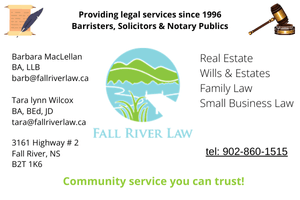HALIFAX: Today, March 22, Nova Scotia declared a provincial state of emergency to help contain the spread of COVID-19. Nova Scotians should not leave the province and only leave home for essential items and services.
A state of emergency gives government broad powers to do whatever is necessary for the safety and protection of Nova Scotians.
“These decisions were not made lightly and should signal to Nova Scotians the seriousness of what’s before us,” said Premier Stephen McNeil. “These orders may seem harsh but they are absolutely necessary. We all have a moral and legal obligation to obey if we want to bring the spread of COVID-19 under control.”
Under the state of emergency:
— Nova Scotia borders will tighten to travellers and all entry points (land, sea, air) will be closely managed starting Monday, March 23, at 6 a.m., Nova Scotians should only leave if essential. Anyone entering the province will be stopped, questioned and told to self-isolate for 14 days. Exemptions for cross-border travel include healthy workers in trades and transportations sectors who move goods and people (e.g. truck drivers); healthy people going to work (e.g. health-care workers); and people travelling into the province for essential health services (e.g. chemotherapy treatment)
— effective immediately, provincial parks, beaches and tourist attractions are closed. Provincial trails will remain open for exercise. Gathering limits and social distancing guidelines must be followed
— police will be authorized to enforce orders under the Health Protection Act. If Nova Scotians and businesses do not practice social distancing and self-isolation, they will face fines of $1,000 for individuals and $7,500 for businesses. Multiple fines can be given each day an individual or business fails to comply. Police can also enforce offences under the Emergency Management Act. For example, fines for charging higher than fair market prices for goods and services
— there are several groups who are essential and exempt from gathering limits. They include but are not limited to grocery stores, gas stations and pharmacies. If possible, one person per family should be designated to do these tasks. Other groups include construction sites, health-care services, community services (e.g. child protection), criminal justice services and law enforcement
New orders in effect under the Health Protection Act include:
— effective immediately, social gatherings of more than five people are prohibited
— any workplace or business that is not deemed essential can remain open as long as a two-metre or six-foot distance can be maintained. Workspaces must also be cleaned and disinfected at a minimum of twice daily or as required and employees follow proper hygiene
— dentists can no longer practice dentistry in their offices unless they deem it necessary to perform an emergency dental procedure in the best interest of the patient’s health (in effect March 21)
“This is a significant adjustment for all of us and people are understandably anxious about the changes in our daily lives,” said Dr. Robert Strang, Nova Scotia’s chief medical officer of health. “Nova Scotians must follow public health direction – practice good hygiene, keep a social distance of six feet and self-isolate for 14 days if you have travelled outside the province or are feeling unwell. It’s up to all of us.”
Seven new cases were identified on Saturday, March 21. All are travel-related or connected to an earlier case. To date, Nova Scotia has 28 positive test results and 2088 negative cases. The 28 individuals affected range in age from late-teens to mid-70’s. Two cases are hospitalized.
The QEII Health Sciences Centre’s Microbiology Lab is now certified to report positive and negative tests for COVID-19. Tests no longer have to be sent to the National Microbiology Lab in Winnipeg.
If you have been in close contact with someone who has travelled and are experiencing fever and/or a new cough you should complete the online questionnaire before calling 811. The online questionnaire can be found at: https://811.novascotia.ca/
Nova Scotians can find accurate, up-to-date information, handwashing posters and fact sheets at https://novascotia.ca/coronavirus .
Quick Facts:
— testing numbers are updated daily at https://novascotia.ca/coronavirus
— Nova Scotia’s Health Protection Act gives the chief medical officer of health the authority to give advice to protect public health and decrease risk to public health presented by communicable diseases such as COVID-19
— the state of emergency is declared under the Emergency Management Act and comes into effect today, March 22, at noon until noon, April 5.
— under the state of emergency government can control or prohibit assembly as well as travel to and from areas. It can also coordinate commerce activity and emergency responders
— high-touch surfaces in homes and workspaces should be cleaned and disinfected with store bought cleaning products or a solution made up of one part bleach to nine parts water
Additional Resources:
The Public Health Agency of Canada maintains a list of affected areas: https://www.canada.ca/en/public-health/services/diseases/2019-novel-coronavirus-infection/health-professionals/covid-19-affected-areas-list.html
Government of Canada: https://canada.ca/coronavirus
Government of Canada toll-free information line 1-833-784-4397
Nova Scotia’s Emergency Management Act: https://nslegislature.ca/sites/default/files/legc/statutes/emergency%20management.pdf
Nova Scotia’s Health Protection Act: https://nslegislature.ca/sites/default/files/legc/statutes/health%20protection.pdf
Fact sheet about cleaning and disinfecting for businesses: https://novascotia.ca/coronavirus/COVID-19-Fact-Sheet-Business.pdf
Fact sheet about cleaning and disinfecting for families: https://novascotia.ca/coronavirus/COVID-19-Fact-Sheet-Families.pdf


























